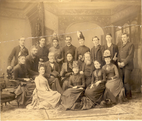Elder Chen has served full-time at a church in southern China for decades. While witnessing the continuous growth of the Chinese church, the now-elderly Elder Chen has also observed some disturbing issues, particularly concerning prayer. He has noticed that many young people today no longer enjoy praying.
The “Glorious History” of Prayer at Chen’s Church
Elder Chen said that his church has emphasized prayer for a long time. During the Cultural Revolution (1966-1976), the church regarded prayer as a top priority. Life was very difficult at the time, and people were extremely poor, often having no other recourse but to pray to God. Every day, 24 people would take turns praying, ensuring the church maintained a 24-hour prayer watch without interruption. They held monthly prayer meetings, attended by pastors and believers unless there were exceptional circumstances.
Chen believes, "Prayer is essential for church growth. If church leaders and members expect the church to develop and experience revival, they must pray constantly. It is also vital for individual believers, who encounter all sorts of problems in life. For Christians, when problems arise, what should they do? Of course, they should pray to God."
He added, "Every year after the Chinese New Year, the church holds a week-long prayer meeting, taking advantage of the period to pray before people return to work. We also have monthly meetings dedicated to praying for our city. Beyond these routine prayers, we often pray for specific issues. It is one of the traditional practices of our older generation, and has never ceased. Moreover, the prayers were spontaneous, not arranged by church staff."
Three Key Characteristics of the Chinese Church
Elder Chen emphasized that prayer is crucial for the Chinese church as a whole.
One brother in Christ once shared with Chen that the Chinese church has three key characteristics, which have allowed it to experience a continuous revival.
The first characteristic is that the church places a strong emphasis on prayer. Throughout the history of the Chinese church, many believers have prioritized prayer, often ministering while praying. During historical periods like the Cultural Revolution when Bibles were scarce, believers could only pray silently, asking God to make way for the church. We can see the importance of prayer in some hymns, such as the well-known song, "China’s Five O’Clock in the Morning."
The second one is that believers have an unending hunger for God’s word. While modern youth often lack patience and dislike long sermons, Chinese Christians in the second half of the 20th century might listen to sermons lasting an hour and a half without issue. Revival retreats often featured sermons lasting three days and nights, with people eagerly listening. This may have been because they could seldom hear a well-prepared sermon in those times, coupled with the hardships of daily life.
The third is that believers have a spirit of generosity. “Why are there so many churches today?” Elder Chen asked. “Of course, it’s due to God’s work. But we cannot deny the contributions of many believers.”
Concerns Amid Revival: Young People Neglect to Pray
Elder Chen has noticed a concerning trend that young people often do not attend prayer meetings, whether it is large or small.
This issue is not limited to young lay believers. Elder Chen observed that many young pastors also struggle with prayer. While their theological training and preaching skills are excellent, and their ministries, families, and personal lives often bear great testimonies, it seems hard for them to pray well or guide others into a deeper prayer life.
“In contrast to our generation, young people today do not value prayer as much,” he said. “They may pray, but not with the same seriousness. Our old generation emphasized practices like morning prayers and fasting prayers, following a clear structure in prayers—praising, remembering God’s grace, and begging God for mercy. Young people may find short prayers manageable, but they struggle with long prayers. It is physically challenging for them to kneel for long periods, and they often run out of words and feel mentally blank.”
Elder Chen believes this stems from a failure to pass on the tradition of prayer effectively.
A Time to Gather: Young and Old Worshiping Together
Elder Chen noted that many churches now separate young people and older members into different fellowships for pastoral reasons, but it has caused a disconnection due to the lack of interaction between the groups.
“I am firmly against this practice of separating young and old into different congregations,” he stated. “Separation may have some advantages, but it blocks the transmission of faith. 1 Peter 5:5 says, ‘Young men, in the same way, be submissive to those who are older,’ highlighting that the church should embrace all ages.”
Elder Chen proposed a hybrid model: “On Sunday afternoons, we can conduct discipleship courses for adults, as well as gatherings for young people, business professionals, and working adults separately. However, the Sunday morning worship service should bring all the people together. Only in such a setting can people develop a sense of belonging and realize, ‘My parents, grandparents, and I are all here together, worshiping God as a family.’”
By worshiping together, Elder Chen believes that young people and older generations can develop deeper spiritual connections. On this basis, the faith of the older generation can be passed down more effectively to the younger generation, and the same is true of the tradition of prayer.
- Edited by Karen Luo, translated by Abigail Wu












